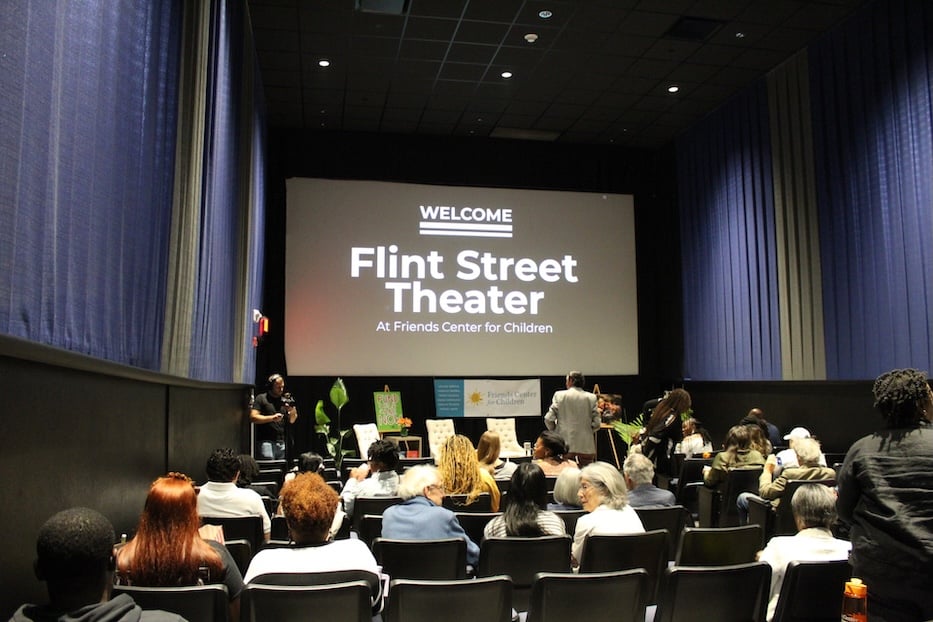
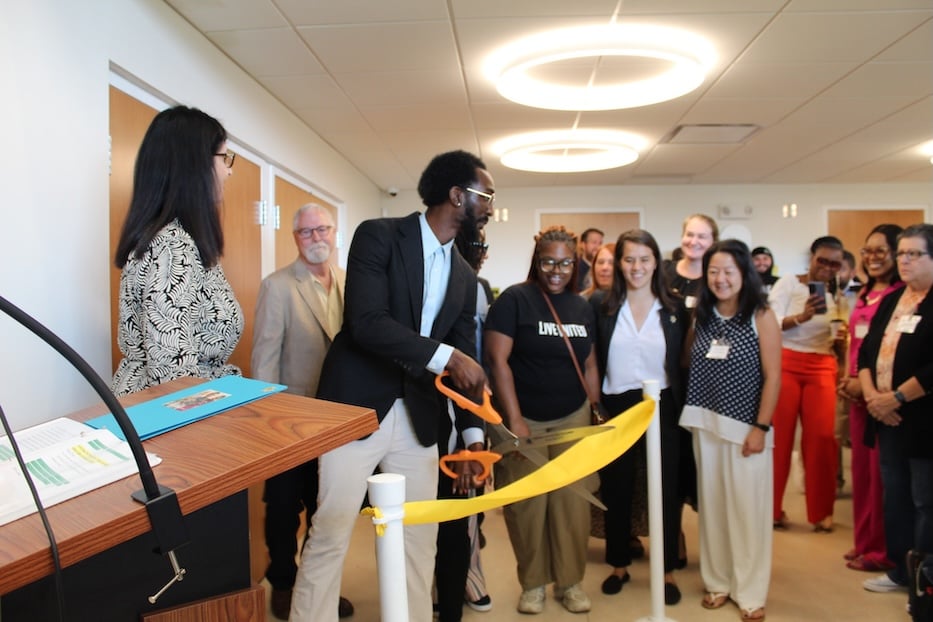
Jayla Anderson Photos.
When Allyx Schiavone was in eighth grade, she stole a giant A from the marquee of the Ciné 4 on Middletown Avenue. Back then, it was one of many movie theaters thriving in New Haven, before the advent of streaming forced them out of business one by one. Three and a half decades later, she and colleagues have transformed the old theater into a bustling hub of community, culture, and creative learning, designed for New Haveners of all ages.
That news came to 25 Flint St. last week, as Friends Center for Children staff members cut the ribbon on the fully revitalized, 125-seat Flint Street Theatre, a screening venue and arts space that is also a haven for early childhood education. As it launches a series of screenings this month and into the fall, the center is also working to become a nucleus for families in New Haven’s Quinnipiac Meadows neighborhood, with space for 32 infants and toddlers at its newest campus.
“I am grateful to Friends Center for the opportunity to deepen this work and expand this impact,” said musician, Seeing Sounds festival producer and mentor Trey Moore (a.k.a. Orion Solo), who has been tapped as the theater program planner and coordinator. “I have hope that the theater will play a fundamental part in someone else’s creative journey.”
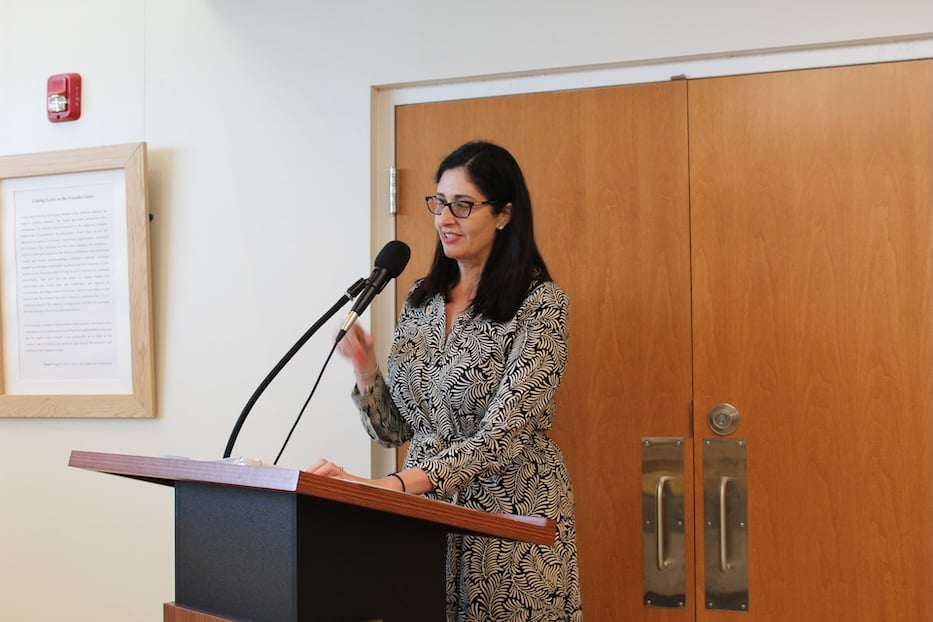
Allyx Schiavone: No need to steal from the building anymore.
While the space foregrounds the organization’s educational mission—there are four infant/toddler classrooms with four outdoor play areas, which translates to 32 young students and 10 educators—it also fills a specific cultural need in New Haven, where the Bow Tie Criterion Cinema closed in September 2023. At the time, the Bow Tie was the city’s last commercial movie theater, leaving only an adult theater and handful of seasonal screening pop-ups around the city.
Now, artists won’t have to travel out of the city for films that feel best on the big screen. A curated lineup from Moore includes Saturday flicks for kids (the next one, on August 30, is Despicable Me 4) and indie, art house films for more mature audiences, like Greg Kwedar’s Sing Sing and Karen Thorsen’s James Baldwin: The Price of the Ticket. All films are free to attend, although an RSVP is suggested. All of them come with the option of free popcorn as well.
In addition, the theater features sliding-scale rental spaces for artists, a priority for Moore because he’s seen firsthand how often creatives need that space to work, gather, rehearse and innovate. Next month, he plans to introduce a series called “Elm City Reels,” featuring local filmmakers and starting September 21.
“New Haven played a vital role in my own development as an artist,” Moore said at the ribbon cutting, before grabbing an oversized pair of orange-handled scissors to do the honors. “It’s because of the challenges I face that I’ve made it my mission to help others overcome similar barriers.”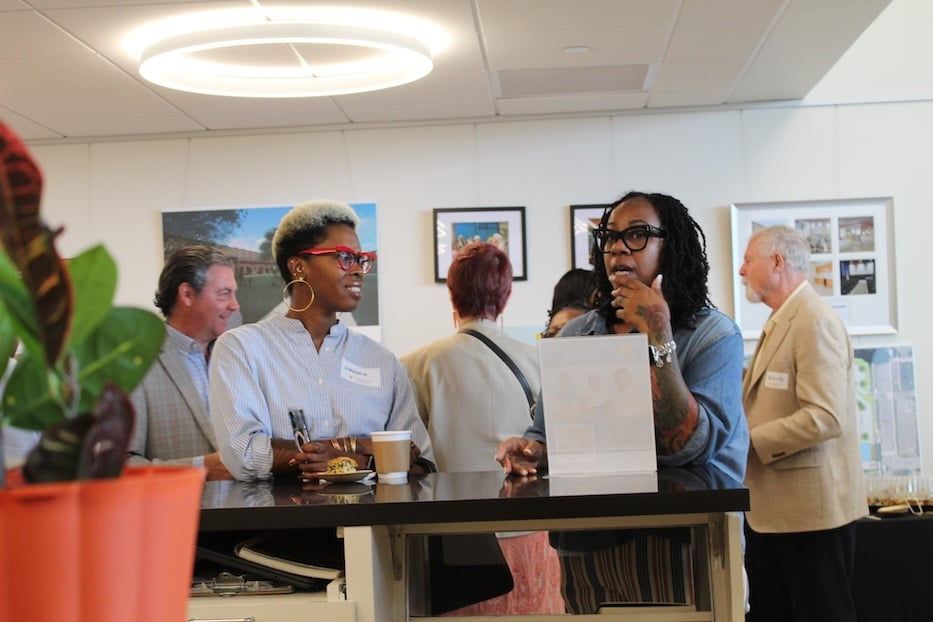
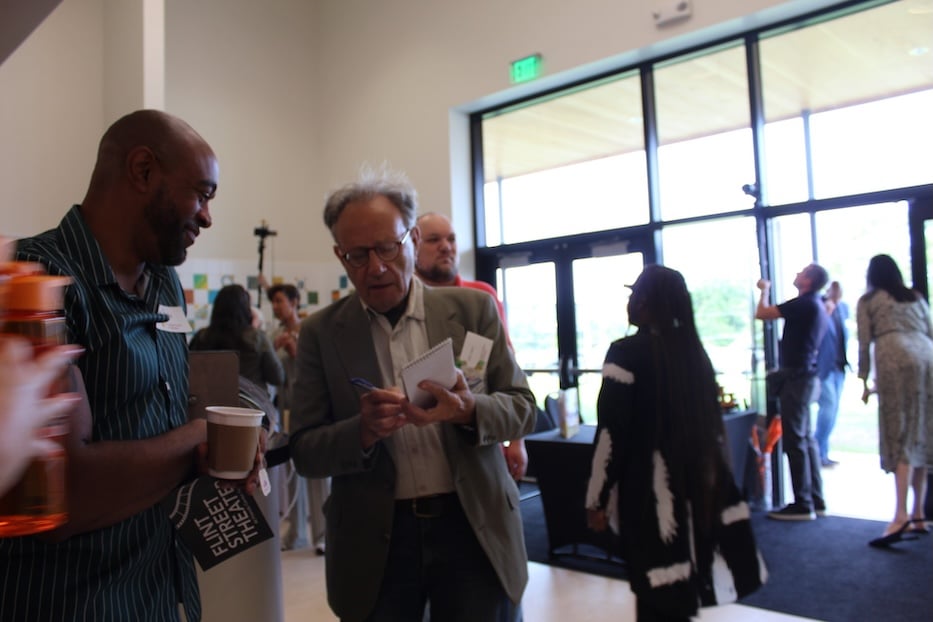
“I am grateful to those in this center who use discernment,” added BLOOM founder and owner Alisha Crutchfield, who sits on the city’s Cultural Affairs Commission and was delighted to see the space open. “Our children deserve to experience joy.”
It is part of the Friends Center’s growing educational footprint, which includes campuses in Fair Haven Heights and Westville, and plans for a fourth campus in the city’s Dixwell neighborhood, where ConnCORP has broken ground for a multi-use development on Dixwell Avenue. Tentatively called ConnCAT Place at Dixwell, that space will also feature mixed-income apartment housing, access to healthcare from Cornell Scott-Hill Health Center, a food hall, grocery store and assorted retail.
As Schiavone, Moore and others cut a ribbon last week, any attendee (and there were, in fact, dozens) could feel the enthusiasm, which flowed from a transformed lobby to the theater itself, where cozy, upholstered chairs sat amidst original art and a bright Friends Center banner at the front of the room. Inside the space, staff welcomed Dr. Karen Baptiste (or as she often prefers, simply “Dr. K”) for a screening of her Emmy-nominated documentary, Preschool To Prison.
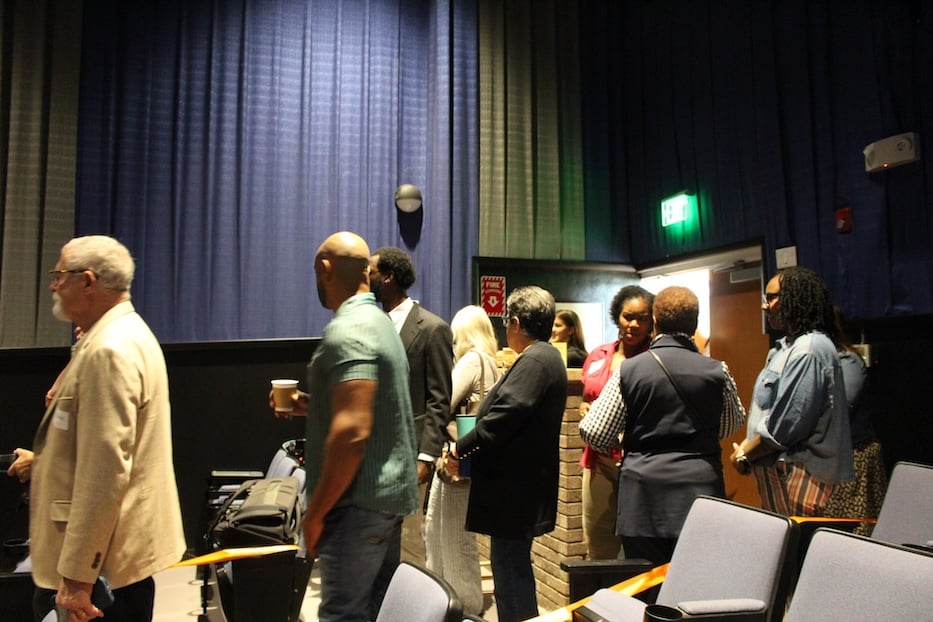
The 30-minute documentary, which Baptiste first released in 2023, explores how public education became (and to this day, often becomes) dangerously punitive, particularly for Black and Brown children, starting at an early age. Through a series of first-person accounts and primary source interviews, Baptiste documents the deep racism baked into American public education, from in-classroom verbal abuse and reprimands to physical action that teachers and administrators too often take against their students.
Along the way, Baptiste leans into sobering data, like the fact that Black students are much more likely than their white peers to receive a referral to special education.
These perceived “offenses”—which are not really offenses at all, so much as young kids trying to learn to exist in a system that was not made for them—make it more likely that the same young people will be profiled and arrested as they get older, a nod to the title of the film. According to Baptiste, over 50 thousand preschoolers are suspended and 17 thousand are expelled each year in the U.S.
The film encourages the practice of equity in the classroom, rather than expulsion of students who are too young to even fully regulate their emotions.
“Our state, Connecticut, spends $1,500 a day incarcerating people, while the average preschool teacher makes 94 dollars a day,” Schiavone said. “At [the] Friends Center, we know that two things can be true at the same time. It can be shocking to learn how much more we spend on cages than on classrooms, and we can be here to welcome you to a new community space.”
Following the screening, Baptiste, along with cast members Pia Johnson and Thorin Daye, joined Friends Center Program Director Miriam Sutton in a Q&A for community members. Of the dozens in attendance, many followed up, probing the tie between education, incarceration, art, and community. By the end of the morning, it was clear that all sought to empower New Haven’s children.
“Many people ask me for a solution,” Baptiste said. “I can’t give you a solution to your community. I do know that the people closest to the problem are the closest to the solution.”
Jayla Anderson is a graduate of the Arts Council's Youth Arts Journalism Initiative. A proud graduate of Cooperative Arts & Humanities High School, where she studied dance, she is now a rising sophomore at Vassar College.